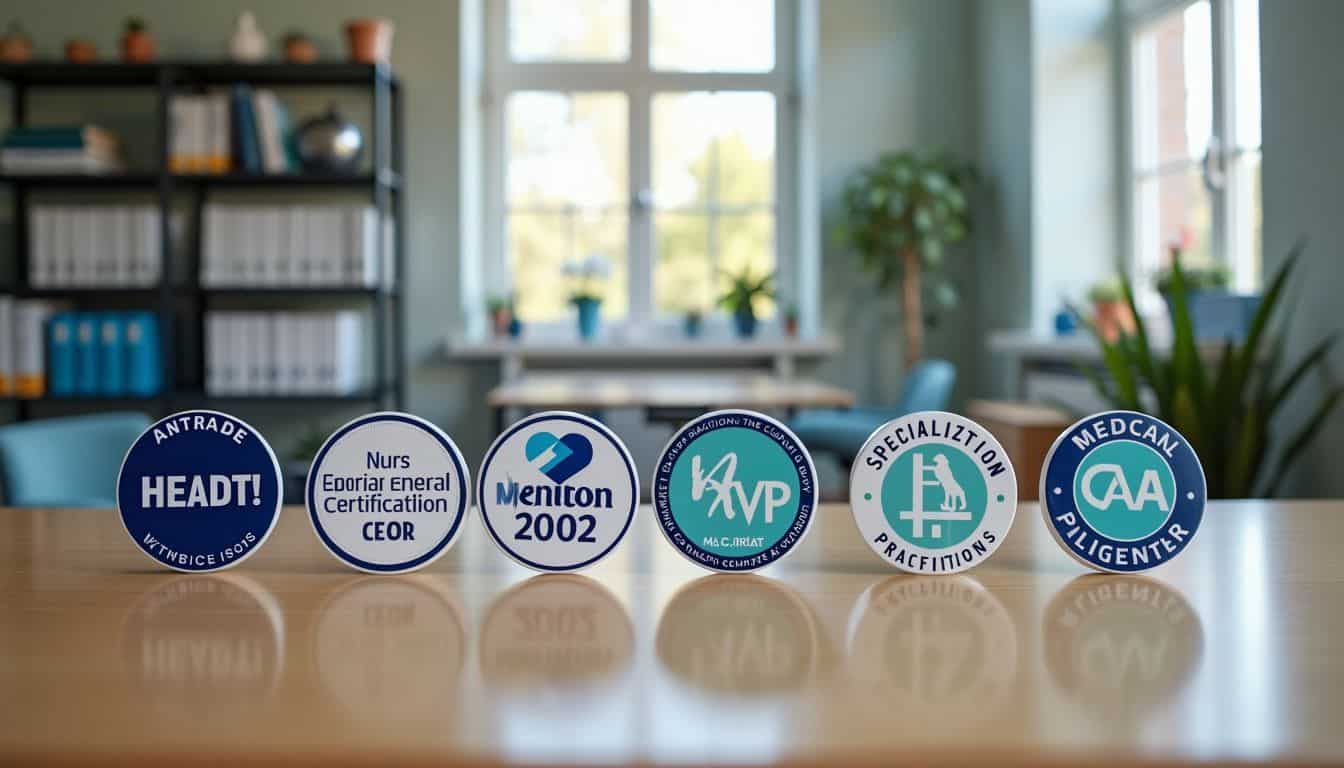Dreaming of becoming a nurse practitioner but feeling lost? You’re not alone. Many aspiring healthcare professionals wonder how to start this rewarding career path. Nurse practitioners earn an average salary of $120,680 per year and perform duties similar to physicians.
This article will guide you through the five essential steps to become a nurse practitioner. Ready to turn your dream into reality? Let’s get started!
Key Takeaways
Becoming a nurse practitioner requires a BSN degree, passing the NCLEX-RN exam, gaining nursing experience, completing a graduate program, and getting licensed and certified.
Nurse practitioners earn an average salary of $120,680 per year and have a job growth outlook of 45% from 2022 to 2032.
There are multiple educational paths to become a nurse practitioner, including BSN, MSN, and DNP degrees. Each has different time requirements and career opportunities.
Nurse practitioners can specialize in areas like family practice, psychiatry, pediatrics, adult-gerontology, and acute care. Specialization requires additional certifications.
Ongoing education is crucial for nurse practitioners. They must complete 20 contact hours every two years, including 5 hours on pharmacology, to maintain their license.
Table of Contents
Understanding the Role of a Nurse Practitioner

Now that we’ve covered the basics, let’s dive into what nurse practitioners (NPs) actually do. These healthcare heroes wear many hats! They’re like super-nurses with extra powers. NPs can diagnose illnesses, prescribe meds, and even run their own clinics in some states.
They’re the go-to pros for primary care, seeing patients for check-ups, managing chronic conditions, and offering health advice.
But wait, there’s more! NPs aren’t just about treating sniffles and bumps. They’re leaders in their field, often specializing in areas like family health, mental health, or pediatrics.
Nurse practitioners are the Swiss Army knives of healthcare – versatile, reliable, and always there when you need them.
With a median salary of $121,610, it’s a rewarding career both personally and financially. And get this – the job outlook is booming! We’re talking 45% growth from 2022 to 2032. That’s way faster than average.
No wonder nearly 90% of NPs are certified in primary care. It’s where the action is!
Essential Steps to Becoming a Nurse Practitioner

Ready to dive into nursing? Let’s break down the must-dos for becoming a nurse practitioner. These steps will set you on the right path to your dream job in healthcare.
Earn Your Bachelor of Science in Nursing (BSN)

Getting your BSN is a big step in becoming a nurse practitioner. Most BSN programs take 4 years to finish. But don’t sweat it if you already have an associate degree in nursing (ADN).
You can do an RN-to-BSN program, which is quicker. These programs let you build on what you already know. If you have a bachelor’s in another field, you’re in luck! You can do an accelerated BSN program.
These are faster and get you into nursing sooner.
During your BSN, you’ll learn a lot about patient care, health assessment, and nursing theory. You’ll also get hands-on experience in hospitals and clinics. This mix of book learning and real-world practice is important.
It prepares you for success as a future nurse practitioner program online student. A strong BSN foundation is crucial for your future career.
It’s the first big step on your path to becoming a nurse practitioner!
Pass the NCLEX-RN Examination

Ready to become a licensed RN? You’ll need to ace the NCLEX-RN exam. This test is no walk in the park – it’s got 75 to 145 questions that’ll put your nursing know-how to the test.
But don’t sweat it! With some solid prep, you can knock it out of the park.
Think of the NCLEX as your ticket to the nursing big leagues. It’s not just about memorizing facts. You’ll need to show you can think on your feet and make smart choices for patients.
Study hard, take practice tests, and go in with confidence. Once you pass, you’ll be all set to start your journey as a registered nurse. It’s a tough exam, but you’ve got this!
Gain Relevant Experience in Nursing

Nursing experience is essential for becoming a nurse practitioner. Most programs require 1–2 years of hands-on patient care. Start small – work as a CNA, LPN, or RN to build your skills.
These entry-level jobs teach you the basics and help you decide if nursing’s right for you. Plus, they look great on your resume!
Experience is the best teacher in nursing.
Don’t just clock in and out. Make the most of your time on the job. Ask questions, watch senior nurses, and learn all you can. Try different areas like the ER or ICU to find your passion.
The more you learn now, the better prepared you’ll be for advanced practice later. Every patient interaction is a chance to grow as a nurse.
Complete a Graduate Program in Nursing

Ready to level up your nursing career? A graduate program is your next big step. These programs are comprehensive, giving you deep knowledge and hands-on skills. Most take 1–2 years for a Master’s, or 3–6 years for a DNP.
You’ll learn advanced topics like health assessment and pharmacology. Plus, you’ll get real-world practice through clinical rotations. It’s about more than just studying – you’ll learn to think critically and lead in healthcare.
Getting into these programs can be challenging. You’ll need a BSN and an RN license to start. Schools also ask for transcripts, essays, and letters from people who know your work. But don’t let that discourage you! If you’re passionate about nursing, you’ve got what it takes.
This is your chance to become an excellent healthcare provider. So, roll up your sleeves and get ready for an exciting journey!
Secure Nurse Practitioner Licensure and Certification

After finishing your graduate program, you’re ready for the final hurdle. Getting your nurse practitioner license and certification is like crossing the finish line of a marathon. You’ve trained hard, and now it’s time to prove your skills.
First, you’ll need to pass a national board exam. It’s tough, but you’ve got this! Once you ace that test, you’ll apply for state licensure. Each state has its own rules, so check what yours needs.
Don’t forget – you’ll need to keep your license and certification up-to-date. It’s like getting a yearly check-up for your career. Stay on top of it, and you’ll be set to help patients as a certified nurse practitioner.
Educational Routes for Nurse Practitioners

Ready to hit the books? There’s more than one way to become a nurse practitioner. You’ve got options – from a bachelor’s to a doctorate. Each path has its perks, so pick the one that fits you best!
Pursue a Bachelor of Science in Nursing (BSN)
A Bachelor of Science in Nursing (BSN) is your first big step to becoming a nurse practitioner. It’s a four-year degree that teaches you the basics of nursing care. You’ll learn about human anatomy, how to give meds, and ways to keep patients healthy.
Most schools want you to have a high school diploma and good grades to get in. Some even ask for SAT or ACT scores.
Nursing is not just a job, it’s a calling. The BSN is your first step on an amazing journey.
During your BSN, you’ll spend time in classrooms and hospitals. You’ll practice on real patients under the watch of seasoned nurses. It’s hard work, but it’s worth it! The hands-on experience is priceless.
By the end, you’ll be ready to take the big test to become a registered nurse.
After your BSN, you’ll be set to move on to the next step: passing the NCLEX-RN exam.
Attain a Master of Science in Nursing (MSN)
Ready to level up your nursing career? An MSN degree is your ticket to bigger roles and better pay. Most full-time programs take 1–2 years to finish. You’ll need a BSN, an RN license, and a decent GPA (usually 2.5-3.5) to get in.
Some schools might ask for GRE scores too. Don’t sweat it, though – this degree opens doors to exciting jobs like nurse practitioner or clinical specialist.
In your MSN program, you’ll dive deep into advanced nursing topics. You’ll learn about health policy, research methods, and leadership skills. Plus, you’ll get hands-on experience in your chosen specialty.
It’s tough work, but it’s worth it. With an MSN, you’re set to make a real difference in healthcare.
Earn a Doctor of Nursing Practice (DNP)
Ready to take your nursing career to new heights? A Doctor of Nursing Practice (DNP) might be your ticket. This top-tier degree takes 3–4 years full-time or 6–7 years part-time. It’s not a walk in the park, though.
You’ll need an MSN, solid grades (3.0 GPA or higher), and an RN license to get in. Plus, you should have some nursing research and stats under your belt.
DNP programs are tough but rewarding. They dive deep into advanced practice, leadership, and healthcare policy. You’ll learn to tackle complex health issues head-on. Many nurses find this degree opens doors to high-level roles in hospitals, clinics, and beyond.
It’s a big step, but for those who dream big in nursing, it’s often worth the effort.
Specialization Certifications for Nurse Practitioners

Nurse practitioners can pick from a bunch of cool specialties. Want to know more? Keep reading!
Become a Family Nurse Practitioner
Family Nurse Practitioners (FNPs) play a vital role in healthcare. They’re like superheroes in scrubs! These pros can diagnose, treat, and even prescribe meds for patients of all ages.
Want to join their ranks? You’ll need a master’s degree or higher and 500 clinical hours under your belt. But don’t let that scare you off – the payoff is sweet. FNPs earn an average of $118,040 per year.
That’s not too shabby for a job where you get to help people every day!
Becoming an FNP opens doors to many work settings. You might find yourself in a busy ER, a quiet doctor’s office, or even making house calls. It’s a career that lets you blend your love for nursing with the skills of a nurse assistant and the know-how of a doctor.
Plus, you’ll be on the front lines of disease prevention and health promotion. It’s a job that’s as rewarding as it is challenging – perfect for those who want to make a real difference in people’s lives.
Qualify as a Psychiatric Nurse Practitioner
Moving from family care to mental health, let’s explore becoming a Psychiatric Nurse Practitioner. This role blends nursing skills with mental health expertise. You’ll need a master’s or doctoral degree to get certified.
It’s a rewarding path that lets you help people with mental health issues.
As a Psychiatric NP, you’ll diagnose and treat mental health conditions. You might work in hospitals, clinics, or private practice. The pay is good too – the average salary is $137,000 per year.
It’s a great choice if you love nursing and want to focus on mental health care.
Train as a Pediatric Nurse Practitioner
Pediatric Nurse Practitioners (PNPs) rock! They’re the superheroes of kid healthcare. These pros work with babies, kids, and teens to keep them healthy and happy. Want to join their ranks? You’ll need to get certified by the Pediatric Nursing Certification Board.
It’s a big deal, but totally worth it.
Here’s the cool part – PNPs make bank! On average, they rake in about $113,127 a year. Not too shabby, right? But it’s not just about the cash. You’ll get to make a real difference in young lives every single day.
From giving shots to treating tummy aches, you’ll be the go-to person for all things kiddo health. It’s a tough job, but someone’s gotta do it… and that someone could be you!
Specialize as an Adult-Gerontology Nurse Practitioner
Adult-Gerontology Nurse Practitioners (AGNPs) focus on caring for older adults. They work in various settings like hospitals, clinics, and nursing homes. AGNPs handle complex health issues that come with aging.
They treat conditions such as heart disease, diabetes, and arthritis. These nurses also help patients manage multiple medications and chronic illnesses.
AGNPs can choose between two paths: acute care or primary care. Acute care AGNPs work in emergency rooms and intensive care units. Primary care AGNPs often work in doctor’s offices or community health centers.
Both roles offer a median yearly salary of $109,820. This specialty lets you make a big impact on older adults’ lives. Next, let’s look at the licensing and certification requirements for nurse practitioners.
Certify as an Acute Care Nurse Practitioner
Acute Care Nurse Practitioners (ACNPs) work in fast-paced settings like ERs and urgent care. They help very sick patients who need quick care. To become an ACNP, you’ll need special training after your nursing degree.
You’ll learn how to handle emergencies and make quick choices.
Getting certified as an ACNP opens doors to exciting jobs. You might work in a big-city hospital or a small-town clinic. The work is tough but rewarding. You’ll use your skills to save lives every day.
Next, let’s look at the rules for getting your license and certification.
Licensing and Certification Requirements

Getting your license and certification is a big deal for nurse practitioners. It’s not just about passing tests – it’s about proving you’re ready to help people. Want to know more about what it takes? Keep reading!
Understand State Licensure Requirements
State rules for nurse practitioner licenses can be tricky. Each state has its own set of rules. In Texas, for example, you’ll need to pay a fee, send in official school records, and pass a national test.
It’s key to check your state’s exact needs. Some states might ask for extra steps or papers.
Don’t assume all states work the same way. What’s true in one place might not apply elsewhere. It’s smart to look up the rules early in your journey to become a nurse practitioner.
This way, you can plan ahead and avoid surprises. Next, let’s talk about getting ready for those big national tests.
Prepare for National Certification Exams
Ready to tackle those national certification exams? You’ve got this! These tests are important for nurse practitioners. They show you know your stuff in your special area. Most states say you need to pass these exams to get your license.
It’s like the final boss in a video game – beat it, and you level up!
Study hard, but don’t stress too much. Use practice tests to get used to the format. Join a study group or find a mentor to help you prep. Keep in mind, lots of nurses have done this before you.
You’re not alone in this… With some hard work and smart studying, you’ll ace those exams and be on your way to helping patients in no time!
Career Prospects and Opportunities for Nurse Practitioners

Nurse practitioners have tons of job options! From hospitals to private practices, the sky’s the limit. Want to know more about where your NP career could take you? Keep reading!
Explore Employment Settings
Nurse practitioners (NPs) have lots of job options. They can work in big hospitals, busy ERs, or small clinics. Some NPs even set up their own offices! It’s great to know that 69% of NPs work in primary care.
This means they’re often the first person patients see for health issues.
NPs also find jobs in urgent care centers. These places help folks who need quick medical help but aren’t super sick. Some NPs like to work with special groups, like kids or older adults.
Others focus on specific health problems, such as heart disease or mental health. With so many choices, NPs can pick a job that fits their skills and interests best.
Consider Career Advancement Options
Nurse practitioners have lots of ways to grow their careers. You could become a Nurse Educator and teach the next generation of nurses. Or, you might like being a Nurse Informaticist, using tech to improve patient care.
If you’re a born leader, aim for Chief Nursing Officer. These roles let you shape healthcare in big ways.
Want to really boost your career? Think about getting a Doctor of Nursing Practice (DNP) degree. It’s not easy, but it’s worth it. A DNP can open doors to higher-level jobs and better pay.
Plus, you’ll gain deep knowledge that’ll make you a top expert in your field. Ready for the next step? Let’s talk about keeping your skills sharp through ongoing education.
Continuing Education and Advancement in Nursing

Nursing never stops teaching you! Keep growing in your career with ongoing classes and new skills. Want to know more? Read on….
Meet Requirements for Maintaining Licensure
Keeping your nurse practitioner license active is crucial. Every two years, you’ll need to renew it. This means completing 20 contact hours of education. Five of these hours must focus on drug treatments.
You’ll also need 400 hours of hands-on practice. It’s a bit like keeping your car tuned up – regular maintenance keeps everything running smoothly.
But wait, there’s more! If you have a special certification, you’ll need extra hours. Specifically, 75 contact hours in your specialty area. It’s like being a superhero – you’ve got to keep your powers sharp.
These rules help ensure you’re always at the top of your game, ready to give patients the best care possible.
Explore Opportunities for Further Specializations
After keeping your license current, you might want to grow your skills even more. Nurse practitioners can pick from lots of special areas to focus on. You could become an expert in emergency care, helping people when they need it most.
Or maybe you’d like to work with moms and babies as a women’s health specialist. These paths offer new and exciting challenges.
Going back to school for a higher degree can open doors too. An MSN or doctorate can lead to bigger roles and better pay. Plus, you’ll learn cutting-edge stuff that’ll make you a top-notch caregiver.
It’s all about finding what lights your fire and going for it! Whether it’s a new skill or a fancy degree, there’s always room to grow in nursing.
People Also Ask
What’s the first step to becoming a nurse practitioner?
Start as a registered nurse (RN). You’ll need to finish nursing school and pass the National Council Licensure Examination. It’s like building a house – you need a solid foundation!
How much schooling do I need after becoming an RN?
You’ll need to hit the books again! Get a graduate-level degree, like a Master’s or Doctorate in Nursing. It’s a bit like leveling up in a video game – each step makes you more powerful.
What kinds of nurse practitioners are there?
There’s a flavor for everyone! You could be a family practice NP, work in women’s health, or even become a psychiatric mental health nurse practitioner. It’s like picking your favorite ice cream – so many tasty options!
Do nurse practitioners need special certifications?
You bet! After your advanced education, you’ll need to get board certification in your chosen specialty. It’s like getting a gold star on your homework, but way more important.
Can nurse practitioners prescribe medicine?
In most cases, yes! NPs have prescriptive authority, but the exact rules can vary by state. It’s like having a special key to the medicine cabinet.
What’s the job outlook for nurse practitioners?
It’s looking sunny! The demand for advanced practice registered nurses (APRNs) is growing fast. The median annual salary is pretty sweet too. It’s like finding a pot of gold at the end of a rainbow – but you’ve earned it!
References
https://www.aanp.org/news-feed/explore-the-variety-of-career-paths-for-nurse-practitioners (2020-11-10)
https://nursejournal.org/nurse-practitioner/how-to-become-a-np/ (2024-05-30)
https://www.usa.edu/blog/how-to-become-a-nurse-practitioner/
https://www.regiscollege.edu/blog/nursing/how-become-nurse-5-key-steps
https://www.nursingprocess.org/nurse-practitioner.html
https://www.ncbi.nlm.nih.gov/pmc/articles/PMC10683711/
https://www.incrediblehealth.com/blog/family-nurse-practitioner/ (2022-11-17)
https://nursejournal.org/careers/psychiatric-nurse/how-to-become/
https://careeremployer.com/nursing/aprn-specialties/become-a-pediatric-nurse-practitioner/ (2023-05-18)
https://nursejournal.org/nurse-practitioner/pediatric/how-to-become/
https://nursejournal.org/nurse-practitioner/gerontology/
https://nursinglicensemap.com/advanced-practice-nursing/nurse-practitioner/adult-gerontology-np/
https://nursinglicensemap.com/advanced-practice-nursing/nurse-practitioner/acute-care-acnp/
https://nursejournal.org/careers/acute-care/how-to-become/ (2022-05-22)
https://www.nursepractitioneronline.com/how-to-become/licensing-certification/ (2024-04-13)
https://www.intelycare.com/career-advice/how-to-become-a-nurse-practitioner/
https://www.herzing.edu/skills/nurse-practitioner
https://www.indeed.com/career-advice/career-development/advancement-opportunities-for-nurses (2024-04-18)
